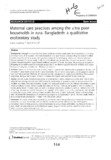| dc.contributor.author | Choudhury, Nuzhat | |
| dc.contributor.author | Ahmed, Syed Masud | |
| dc.date.accessioned | 2019-12-01T08:14:14Z | |
| dc.date.available | 2019-12-01T08:14:14Z | |
| dc.date.issued | 2010 | |
| dc.identifier.citation | Choudhury, N., & Ahmed, S. M. (2010). Maternal care practices among the ultra poor households in rural Bangladesh: a qualitative exploratory study. Research Reports (2010): Health Studies, Vol - XLII, 140–147. | en_US |
| dc.identifier.uri | http://hdl.handle.net/10361/13159 | |
| dc.description.abstract | Background Although many studies have been carried out to learn about maternal care practices in rural areas and urban-slums of Bangladesh, none have focused on ultra poor women. Understanding the context in which women would be willing to accept new practices is essential for developing realistic and relevant behaviour change messages. This study sought to fill in this knowledge gap by exploring maternal care practices among women who participated in a grant-based livelihood programme for the ultra poor. This is expected to assist the designing of the health education messages programme in an effort to improve maternal morbidity and survival towards achieving the UN millennium Development Goal 5. Methods Qualitative method was used to collect data on maternal care practices during pregnancy, delivery, and post-partum period from women in ultra poor households. The sample included both currently pregnant women who have had a previous childbirth, and lactating women, participating in a grant-based livelihood development programme. Rangpur and Kurigram districts in northern Bangladesh were selected for data collection. Results Women usually considered pregnancy as a normal event unless complications arose, and most of them refrained from seeking antenatal care (ANC) except for confirmation of pregnancy, and no prior preparation for childbirth was taken. Financial constraints, coupled with traditional beliefs and rituals, delayed care-seeking in cases where complications arose. Delivery usually took place on the floor in the squatting posture and the attendants did not always follow antiseptic measures such as washing hands before conducting delivery. Following the birth of the baby, attention was mainly focused on the expulsion of the placenta and various maneuvres were adapted to hasten the process, which were sometimes harmful. There were multiple food-related taboos and restrictions, which decreased the consumption of protein during pregnancy and post-par tum period. | en_US |
| dc.language.iso | en | en_US |
| dc.publisher | BRAC Research and Evaluation Division (RED) | en_US |
| dc.subject | Maternal care | en_US |
| dc.subject | Ultra poor | en_US |
| dc.subject.lcsh | Maternity nursing | |
| dc.subject.lcsh | Prenatal care | |
| dc.subject.lcsh | Rural health services--Utilization--Bangladesh. | |
| dc.title | Maternal care practices among the ultra poor households in rural Bangladesh: a qualitative exploratory study | en_US |
| dc.type | Research report | en_US |

